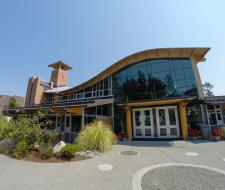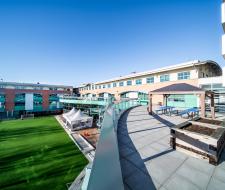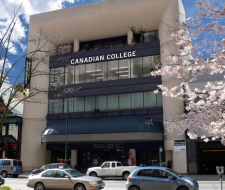Private schools in Province of British Columbia
- British Columbia Private Schools for Foreigners: Key Benefits
- School education in British Columbia: varieties, programs and features
- Organization of the educational process in private schools in British Columbia
- Accommodation and meals in private schools in British Columbia
- British Columbia Private School Tuition Fees
-
 In 2020 the highest grade received towards the IB Diploma - 40
In 2020 the highest grade received towards the IB Diploma - 40 CanadaVictoria, British ColumbiaCurrently watching: 10from 65600.00 $CAD / year
CanadaVictoria, British ColumbiaCurrently watching: 10from 65600.00 $CAD / year -
 This past year, 70% of the graduating class received an offer of admission from their firs
This past year, 70% of the graduating class received an offer of admission from their firs CanadaVictoria, British ColumbiaCurrently watching: 6from 33320.00 $CAD / semester
CanadaVictoria, British ColumbiaCurrently watching: 6from 33320.00 $CAD / semester -
 In 2023, 126 graduates received offers of admission from 84 universities in 13 countries
In 2023, 126 graduates received offers of admission from 84 universities in 13 countries CanadaVancouver, British ColumbiaCurrently watching: 7from 1200.00 $CAD / month
CanadaVancouver, British ColumbiaCurrently watching: 7from 1200.00 $CAD / month -
 In 2023 100% graduates achieved IB Diploma
In 2023 100% graduates achieved IB Diploma CanadaVancouver, British ColumbiaCurrently watching: 9from 49800.00 $ / year
CanadaVancouver, British ColumbiaCurrently watching: 9from 49800.00 $ / year -
 from 79630.00 $CAD / year
from 79630.00 $CAD / year -
 #1 Fashion&Design career school
#1 Fashion&Design career school CanadaVancouver, British ColumbiaCurrently watching: 2from 6965.00 $CAD / term
CanadaVancouver, British ColumbiaCurrently watching: 2from 6965.00 $CAD / term -
 from 210.00 $CAD / week
from 210.00 $CAD / week -
 from 61750.00 $CAD / year
from 61750.00 $CAD / year -
 from 68810.00 $CAD / year
from 68810.00 $CAD / year -
 from 15400.00 $CAD / year
from 15400.00 $CAD / year
British Columbia occupies a leading position in the national market for primary and secondary education. Non-governmental schools here are renowned for their high level of academic programmes and the practical implementation of the most advanced methodologies, including the IB (International Baccalaureate) and Advanced Placement programmes, which are aimed at students seeking to enrich their academic experience.
From year to year, enrollment in private schools in British Columbia is growing: if in the 1977/78 academic year there were 23.6 thousand students, then in 2022/2023 their number reached 92.6 thousand - 13.7% of the total number of primary and secondary school students. Thus, the proportion of independent education in British Columbia among Canadian provinces is the highest. At the same time, the province also holds the record for the number of children included in waiting lists - 48 thousand according to 2022 data.
British Columbia's private schools are known for having a strong community spirit that shapes environments that extend far beyond the classroom. Local schools have prioritized a holistic approach to education, which includes a wide range of extracurricular activities, from school team competitions to artistic, musical and cultural societies, which, together with an individual approach, ensures that students not only succeed academically and in their careers, but also grow up to be confident people ready to take their place in the world.
Alternative destinations
British Columbia Private Schools for Foreigners: Key Benefits
- Advanced
British Columbia private schools, through extracurricular activities, electives, gifted programs, and other benefits, provide children with exceptional experiences that are not available to public school students. All this adds up to higher average scores on standardized tests and entrance exams — in some schools, 100% of graduates successfully enter the first-choice university (that is, the most prestigious, rating, and priority for themselves).
- Small classes
According to statistics, the smaller the class, the higher the academic results of average students. Non-public schools may vary in size from one to another, but almost all of them point to small class sizes as a key advantage as an opportunity to demonstrate a personal approach to all students. And this is completely justified and fair.
- Parent Involvement
Most private schools are built on the active involvement of parents in the life of the school community. Regular gatherings, social events, breakfasts and family trips and excursions make the family a key element of the learning process, while at the same time contributing to the establishment of strong bonds between children and their parents.
- High qualification of teachers
Teachers in non-public schools are often more qualified than their public school counterparts, and many have advanced degrees in their field. According to a 2017 study by the Fraser Institute, 91% of parents cited the high professionalism of teachers as the reason for choosing a private school.
- Security
Private schools in British Columbia maintain a higher standard of discipline, and a comfortable ratio of teachers to students allows for greater control over their wards. Finally, private schools are perfectly guarded, which excludes the presence of strangers and unauthorized absences of children.
- High-quality infrastructure
The best private schools in British Columbia have significant resources to support their students everywhere from the sports field to the art studio. Modern computer laboratories, rich libraries, good stadiums - all this allows students to fully reveal their talents.
- Extracurricular Program
Private schools can place a strong emphasis on a well-rounded education and encourage children to participate in extracurricular activities such as sports, music, arts or drama. On the one hand, this contributes to the development of useful skills and soft skills, on the other hand, it provides a respite from the stresses associated with the academic load.
- General philosophy
Private schools can offer an optimal productive academic experience for a child: traditional IB, A-level or K-12 programs, Waldorf, Reggio Emilia or Montessori systems allow the child to grow up free and independent, gaining unique skills that suit their learning style.
School education in British Columbia: varieties, programs and features
The structure of the non-state segment of secondary education in British Columbia is quite heterogeneous. In general, schools can be divided into three types: elite, specialized, and denominational; Private schools are further divided into 4 categories according to the level of funding.
At the same time, every independent school in the province is a member of at least one of the 13 school associations, councils or conferences.
- School Associations
Of the province's 370 non-public schools, 297 are members of the Federation of Independent School Associations of British Columbia (FISABC). Members of this association are also members of one or several of six other organizations:
- Association of Independent Schools;
- Independent Catholic schools;
- International Association of Christian Schools;
- Seventh-day Adventist religious schools;
- Schools of the Society of Christian Schools.
Some schools in the province may be members of national and even international associations, such as TASIS or IB (International Baccalaureate) schools.
- Elite Schools
This category includes preparatory schools that have formal membership in ISABC, CAIS, TABS, NCGS or NAIS, which are among the top private schools in British Columbia. There are 29 such schools in the province, of which 10 are boarding schools.
- Specialized Schools
The formal criteria for belonging to this group are more complex. Special schools may have a special curriculum or a special academic focus (football, athletics, music, STEM or engineering, mathematics, etc.), a special pedagogical method (this includes Waldorf and Montessori schools), educational institutions for special groups of students (for example, blind or visually impaired, etc.). This also includes non-governmental schools of indigenous peoples. In total, we are talking about 144 (39%) schools with 20.1 thousand students.
- Denominational Schools
In British Columbia, most non-public schools (62%) accept students. Among religious educational institutions, there are two distinct groups:mass denominational and elite private educational institutions under the patronage of Catholic or Protestant organizations.
- Coeducational schools
This format is common in both public and private schools, and is more common in non-religious schools, although some Catholic schools also practice coeducation.
- Separate schools
The established stereotypes about boys being more inclined towards science and mathematics than girls have no scientific basis. However, it is well known that comfortable learning conditions for children of different genders vary. Single-sex schools strive to meet this need by creating the most comfortable and safe environment for students.
Organization of the educational process in private schools in British Columbia
British Columbia has a twelve-year education: children are sent to school at the age of five, and they graduate at the age of 17-18. Up to the 10th grade, the program is generally standardized and includes a typical set of compulsory disciplines, which can be supplemented with specialized courses, if the schedule allows.
In high school, specialization begins: tenth-graders choose a technical or humanitarian profile, as well as 7 elective subjects. Each subject gives 4 academic credits, in three years you need to get at least 80 of them - otherwise you will not be able to graduate. In the 10th and 11th grades, both basic and specialized disciplines are taught, but in the 12th grade, only those that are required for admission to the university for the chosen program and direction remain in the schedule.
There is no universal set of compulsory subjects even in public schools, let alone private ones. At the same time, the choice is not limited to mathematics, English and physical education: somewhere the "menu" includes natural sciences or a STEM course, somewhere creative disciplines such as dramatic or expressive art, music or acting. This point is important to consider when choosing a school.
Depending on the educational institution, the courses are divided into blocks, most often there are four of them: A, B, C, D. Each has one elective discipline, so there are no permanent classes in Canadian private schools, each student has a personal schedule and different groups that take into account not only the subject, but also the level (basic or profile).
In British Columbia, there are two mandatory exams - English, in the 12th grade, and Canadian history in the 11th.
Accommodation and meals in private schools in British Columbia
- Boarding Schools
Students and teachers in such schools live on campus, often throughout the academic year, without leaving even for vacations. This format provides a specific and sufficiently rich social and educational experience, allows you to become independent, show leadership qualities and learn to build social ties in a variety of conditions - both with peers and adults.
- Day Schools
They are more like a traditional school - after school, students go home. 80% of private schools in the province of British Columbia are day schools without accommodation.
This option implies living in a host family and involves greater flexibility, leaving the teenager freedom of movement and the opportunity to explore the world on their own. There is a stereotype that host families are cheaper than boarding houses, but it all depends on the school itself.
- Nutrition
Schools offer various conditions, up to full boarding with a varied menu and the ability to "adjust" it to the needs of a particular child (diets, food restrictions, vegetarianism). Usually, the dining room has a buffet or salad bar, reverse vending machines with snacks and drinks.
- Activities
Any private school is not only a rigorous academic program, but also dozens, if not hundreds, of extracurricular activities! Basketball and theater clubs, Lego and robotics, board games and gardening, animal care and all kinds of handicrafts, football and swimming, and, of course, the most important game of all Canadians is hockey. In some schools, the choice of electives is fixed, while others, on the contrary, encourage student initiative and support self-organization.
British Columbia Private School Tuition Fees
Canadian private schools today are not only for the rich - the general increase in prosperity has made them more affordable. According to statistics, 56% of families whose children study in independent schools have an income of less than $100 thousand per year. While the average cost of a year of private schools in British Columbia is 26,000 CAD, minimum fees start at 3,000-4,000 CAD, and in the ranking of the TOP-50 best private schools in the province, six have an annual fee of no more than 12,000 CAD.
Schools with high tuition costs often offer scholarship programs. Typically, the scholarship covers 10-20% of the fee, but in rare cases it can be 100%.
Studying at a boarding school is noticeably more expensive: the cost of living varies from 12,000 to 120,000 CAD per year, with an average of 37,000 CAD.
Individual lessons, some extracurricular activities, uniforms, textbooks, long excursions and trips, as well as equipment and supplies for creative circles, rental or purchase of musical instruments and sports equipment are paid separately.
Advantages and disadvantages of English schools
| Advantages | Disadvantages |
|---|---|
| The opportunity to enter the best universities in England, USA, Canada, Switzerland, Europe, the world | Expensive |
| High quality of education and academic standards | Strong workload |
| Perfect English after graduation | The need to change the social environment; it takes time to adapt |
| Useful contacts | The difficulty of choosing the most suitable school for the child, requires a qualified specialist |
Top 35 best schools in the USA - 2026 Smapse rankings
| 1 | North Broward Preparatory School |
| 2 | Phillips Academy Andover |
| 3 | The Storm King School New York |
| 4 | Red Bank Catholic High School |
| 5 | Windermere Preparatory School |
| 6 | Shattuck St Mary's School |
| 7 | Cheshire Academy |
| 8 | Cate School |
| 9 | Ross School |
| 10 | Deerfield Academy |
| 11 | The Village School |
| 12 | Amerigo Los Angeles – Bishop Montgomery High School |
| 13 | Webb Schools |
| 14 | Kent School USA |
| 15 | The Winchendon School |
| 16 | Darlington School |
| 17 | Marian Catholic High School Amerigo Education |
| 18 | Grier School |
| 19 | The MacDuffie School |
| 20 | CATS Academy Boston |
| 21 | The Cambridge School of Weston |
| 22 | Milton Academy |
| 23 | Amerigo Education Napa Valley |
| 24 | American Hebrew Academy |
| 25 | Northfield Mount Hermon School |
| 26 | Mater Dei Catholic High School San Diego Amerigo Education |
| 27 | American University Preparatory School Los Angeles |
| 28 | Webb Schools |
| 29 | Kent School USA |
| 30 | Groton School |
| 31 | Maine Central Institute |
| 32 | The Lawrenceville School |
| 33 | Grand River Academy Ohio |
| 34 | Saint John Paul II Academy |
| 35 | Chicago North Shore |
Top 14 best schools in Switzerland 2026
| 1 | College Du Leman |
| 2 | St. Georges School Montreux |
| 3 | Institut Monte Rosa |
| 4 | Lyceum Alpinum Zuoz |
| 5 | Saint-Charles Collège et Lycée |
| 6 | Leysin American School |
| 7 | Hochalpines Institut Ftan AG High Alpine |
| 8 | Aiglon College Switzerland |
| 9 | Institut Le Rosey School |
| 10 | Institut Montana Zugerberg |
| 11 | Champittet College |
| 12 | Brillantmont International School |
| 13 | Surval Montreux |
| 14 | Ecole Pre Fleuri |
